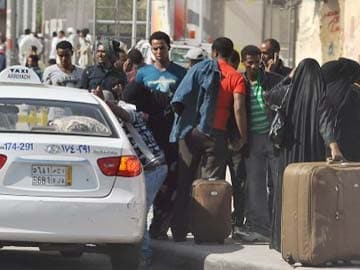
Nitaqat is a Saudization programme introduced by the Saudi Ministry of Labour in June 2011.
AFP Photo
New Delhi:
Saudi Arabia on Thursday clarified that its Nitaqat work policy was directed at illegal expatriates and no legal worker had been affected. The kingdom also said that the Indian community had benefitted from the grace period announced with 1.4 million Indian workers regularizing their status.
The Royal Embassy of Saudi Arabia in New Delhi voiced concern over some negative media reports on the Nitaqat fallout. It said "some of the media reports suggested that Nitaqat programme has created problems for Indian workers".
It clarified that Nitaqat has "nothing to do with the law-enforcement measures being implemented against individuals who are in violation of labour and residency laws and regulations". It said it started acting against illegal workers after granting a grace period of six months to correct and regularize their status. The grace period expired on November 3.
It said the measures were directed at illegal expatriates "irrespective of their nationalities and with the aim of ensuring that all immigrants living in the Kingdom have correct legal status so that their interests and rights are better protected", said the embassy statement.
"No legal workers have been affected by these measures that are meant to implement the labour and residency laws in letter and spirit," it said.
"Moreover, during the six months of the grace period the size of the Indian community in the Kingdom has gone up to nearly 2.8 million," it said.
India's external affairs ministry spokesperson Syed Akbaruddin had said on November 6 that 130,000 Indians who did not possess valid work documents had returned to India in an "orderly" manner.
Mridul Kumar, joint secretary (Gulf) in the ministry, has said that the Indian embassy used the opportunity of the grace period to regularise the status of Indians staying illegally or having invalid visas - those entering on a domestic worker visa but taking up a job in a different category.
"We managed to make it a huge success," he said.
The Saudi Arabian embassy statement also said that the "Indian community is one of the most appreciated expatriate communities in the Kingdom of Saudi Arabia, and that the Kingdom values their contribution to the development projects and strengthening people-to-people contacts between our two friendly countries."
Nitaqat is a Saudization programme introduced by the Saudi Ministry of Labour in June 2011 with an implementation deadline in November 2013. Saudization is the national policy of Saudi Arabia to encourage employment of Saudi nationals in the private sector, which, as of 2006, was largely dominated by expatriate workers from Southeast Asia and to a lesser extent with western expatriates.
The Royal Embassy of Saudi Arabia in New Delhi voiced concern over some negative media reports on the Nitaqat fallout. It said "some of the media reports suggested that Nitaqat programme has created problems for Indian workers".
It clarified that Nitaqat has "nothing to do with the law-enforcement measures being implemented against individuals who are in violation of labour and residency laws and regulations". It said it started acting against illegal workers after granting a grace period of six months to correct and regularize their status. The grace period expired on November 3.
It said the measures were directed at illegal expatriates "irrespective of their nationalities and with the aim of ensuring that all immigrants living in the Kingdom have correct legal status so that their interests and rights are better protected", said the embassy statement.
"No legal workers have been affected by these measures that are meant to implement the labour and residency laws in letter and spirit," it said.
"Moreover, during the six months of the grace period the size of the Indian community in the Kingdom has gone up to nearly 2.8 million," it said.
India's external affairs ministry spokesperson Syed Akbaruddin had said on November 6 that 130,000 Indians who did not possess valid work documents had returned to India in an "orderly" manner.
Mridul Kumar, joint secretary (Gulf) in the ministry, has said that the Indian embassy used the opportunity of the grace period to regularise the status of Indians staying illegally or having invalid visas - those entering on a domestic worker visa but taking up a job in a different category.
"We managed to make it a huge success," he said.
The Saudi Arabian embassy statement also said that the "Indian community is one of the most appreciated expatriate communities in the Kingdom of Saudi Arabia, and that the Kingdom values their contribution to the development projects and strengthening people-to-people contacts between our two friendly countries."
Nitaqat is a Saudization programme introduced by the Saudi Ministry of Labour in June 2011 with an implementation deadline in November 2013. Saudization is the national policy of Saudi Arabia to encourage employment of Saudi nationals in the private sector, which, as of 2006, was largely dominated by expatriate workers from Southeast Asia and to a lesser extent with western expatriates.
Track Latest News Live on NDTV.com and get news updates from India and around the world

